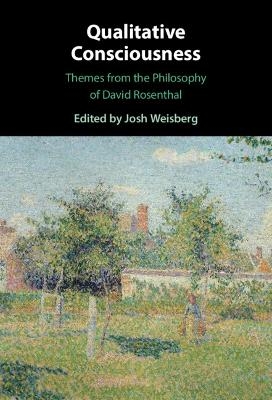
Qualitative Consciousness
Cambridge University Press (Verlag)
978-1-108-48783-2 (ISBN)
Qualitative consciousness is conscious experience marked by the presence of sensory qualities, like the experienced painfulness of having a piano dropped on your foot, or the consciousness of seeing the brilliant reds and oranges of a sunset. Over his career, philosopher David Rosenthal has defended an influential theoretical approach to explaining qualitative consciousness. This approach involves the development of two theories – the higher-order thought theory of mental state consciousness and the quality space theory of sensory quality. If the problem of explaining qualitative consciousness is divided into two more manageable pieces, the door opens to a satisfying explanation of what is seen by some to be an intractable explanatory puzzle. This interdisciplinary collection develops, criticizes, and expands upon themes inspired by Rosenthal's work. The result is an exciting collection of new essays by philosophers and scientists, which will be of interest to all those engaged in consciousness studies.
Josh Weisberg is Associate Professor of Philosophy at the University of Houston. He has published a range of articles in the philosophy of mind and is the author of Consciousness (2014).
Part I. Consciousness: 1. Cognitive Phenomenology: Accessibility vs. Acquaintance Joseph Levine; 2. Two Kinds of Introspection Anna Giustina and Uriah Kriegel; 3. There's Something About David Martin Hahn and Kathleen Akins; 4. Thin Introspection Amy Kind; 5. Confidence Tracks Consciousness Jorge Morales and Hakwan Lau; Part II. Qualities: 6. Rosenthal on Mental Qualities Alex Byrne; 7. Rosenthal's Representationalism Jacob Berger and Richard Brown; 8. Quality Space Theory and Motoric Qualities Myrto Mylopoulos; 9. Qualitative Character and Conceivable Inversions Austen Clark; Part III. Higher-Order Thought: 10. A Challenge: Can Self-Monitoring be Achieved Without Consciousness? Daniel Dennett; 11. Being Self-Involved Without Thinking About it Miguel Angel Sebastian; 12. Higher-Order Thought Theory Meets Phenomenal Intentionality Sam Coleman; 13. Controlling phenomenology by being unaware of intentions Zoltan Dienes, Peter Lush, and Bence Palfi; 14. Mental Appearance and Mental Reality David Rosenthal.
| Erscheinungsdatum | 12.10.2022 |
|---|---|
| Zusatzinfo | Worked examples or Exercises |
| Verlagsort | Cambridge |
| Sprache | englisch |
| Maße | 159 x 235 mm |
| Gewicht | 620 g |
| Themenwelt | Geisteswissenschaften ► Philosophie ► Erkenntnistheorie / Wissenschaftstheorie |
| Geisteswissenschaften ► Psychologie ► Allgemeine Psychologie | |
| Geisteswissenschaften ► Psychologie ► Verhaltenstherapie | |
| ISBN-10 | 1-108-48783-1 / 1108487831 |
| ISBN-13 | 978-1-108-48783-2 / 9781108487832 |
| Zustand | Neuware |
| Informationen gemäß Produktsicherheitsverordnung (GPSR) | |
| Haben Sie eine Frage zum Produkt? |
aus dem Bereich

![Was heißt Denken?. Vorlesung Wintersemester 1951/52. [Was bedeutet das alles?] - Martin Heidegger](/media/113619842)
